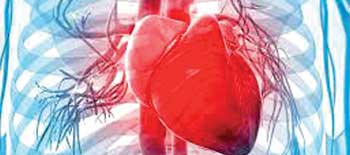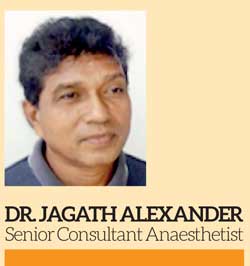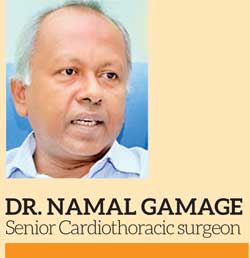13 Oct 2017 - {{hitsCtrl.values.hits}}
heart Health
 With the ascending number of patients suffering from coronary complications, the need for bypass surgeries has also increased. Though heart surgeries are complicated and serious, if it is done by skilled medical professionals counting years of practice, coronary surgeries aren’t causes for worry. Cardiothoracic
With the ascending number of patients suffering from coronary complications, the need for bypass surgeries has also increased. Though heart surgeries are complicated and serious, if it is done by skilled medical professionals counting years of practice, coronary surgeries aren’t causes for worry. Cardiothoracic

surgeon Dr. Namal Gamage and Dr. Jagath Alexander, consultant anaesthetist of the Karapitiya Teaching Hospital, possess reliable pairs of hands when it comes to bypass surgeries. They perform around 70 surgeries for a month. As expert surgeons they addressed the formalities of a bypass surgery to help the public understand that a bypass surgery isn’t as scary as it may sound.
Anaesthesia
Anaesthesia and surgery are two things that go hand in hand. Dr. Alexander explained that anaesthetics render a patient unconscious prior to a surgery.
Anaesthetic Procedure
Anaesthesia is the temporary induction of sensation loss and awareness. According to Dr. Alexander, there are 2 types of anaesthesia. They are general anaesthesia and local anaesthesia. “In local anaesthesia, the patient is conscious and they are mildly sedated. In general anaesthesia, the patient is made unconscious,” he said.
“Bypass is done under general anaesthesia. Anaesthetic dosages vary from patient to patient. The dosages depend on their health conditions and age,” explained Dr. Alexander.
Patients in need of a bypass, generally suffer from non-communicable diseases such as diabetes and high blood pressure. These complications are taken into consideration when administering anaesthesia.The age of a patient is also an important factor when determining the anaesthetic dose. A person of 40 years faces anaesthetic conditions different to the conditions faced by a patient of 72 years. “The doses and methods vary. We check the patients psychologically and physically and give a large consideration to pre operation and post operation care,” he added further.
Basics of a bypass
A bypass is a surgery where damaged or blocked arteries of the heart are replaced using blood vessels from another part of your body.
“When a bypass is done normally 2 things can be considered. One is the heart is stopped and the function of the heart is given to a machine. A bypass graft is performed on the coronary artery, where the bloodvessel is shunted beyond the block,” explained Dr.Alexander. After the patient is sedated and made unconscious, artificial ventilation is used on the patient. Then the bypass surgery is performed.
Are you at risk?
 Patients with heart problems such as artherosclerosis are the ones who undergo a bypass surgery. Dr. Alexander stated coronary issues may be denoted by symptoms such as chest pain, being short of breath, pain in arm, neck, jaw.
Patients with heart problems such as artherosclerosis are the ones who undergo a bypass surgery. Dr. Alexander stated coronary issues may be denoted by symptoms such as chest pain, being short of breath, pain in arm, neck, jaw.
“Patients are required to seek medical attention from a cardiologist. He investigates the patient’s symptoms and diagnoses the condition. If the condition calls for a bypass surgery, the patient is directed to us,”said Dr. Alexander.
Is surgery necessary?
Neglecting chest pains and coronary problems can be fatal. These complications can lead to severe heart attacks.
Rise in no. of heart patients
There has been a substantial increase in the need for bypass surgeries in Sri Lanka. According to Dr. Alexander, this is mainly due to negative behavioural and lifestyle patterns. “Food habits have become a major problem. People consume more and more junk food. They are also mentally not stable at present. Their moods are influenced by stress. Even the younger generation and people below 40 years of age are prone to the needs of bypass surgeries. Smoking and lack of exercises are other major factors that contribute to heart disease,” he opined.
Pre-surgery preparations
Before a bypass surgery is performed, the patient is looked after with great care. “The confidence of the patient should be built before surgery. That is done by the doctor talking to the patient about the surgery before hand and making him ready step by step. If the patient is a smoker, we talk to him about quitting the habit after the surgery,” stressed the doctor.
 The second factor that is looked into before a bypass surgery is the health condition of the patient. The patient’s blood pressure and blood sugar are monitored closely to assure that the conditions are sustained under normal conditions. “The most important thing that is considered before a surgery is whether the patient is suffering from chest infections and coughs.” he said. Dr. Alexander explained the reason for this. “If the chest infection remains at a dormant stage, it could aggravate after the surgery. This could be just as harmful as AIDS due to the immune system of patients dropping after a surgery,” he explained. So the health conditions are considered for 3-4 weeks to ensure stability. Medicines and drugs are stopped 10 days before surgery.
The second factor that is looked into before a bypass surgery is the health condition of the patient. The patient’s blood pressure and blood sugar are monitored closely to assure that the conditions are sustained under normal conditions. “The most important thing that is considered before a surgery is whether the patient is suffering from chest infections and coughs.” he said. Dr. Alexander explained the reason for this. “If the chest infection remains at a dormant stage, it could aggravate after the surgery. This could be just as harmful as AIDS due to the immune system of patients dropping after a surgery,” he explained. So the health conditions are considered for 3-4 weeks to ensure stability. Medicines and drugs are stopped 10 days before surgery.
Post-surgery care
The care given to a patient after a surgery is also quite important. “First of all, if the patient is a smoker the patient has to stop smoking. The patient should be careful to maintain weight, so instructions regarding exercise are given to the patient. They should continue the intake of the prescribed medicine on time,” affirmed Dr. Alexander. He also mentioned that until after one month of operation, the patient should not meet up with visitors as they can carry germs and infections, transmitting disease to the patient. This could be dangerous as the patient’s immune system drops after surgery. Meeting visitors can be especially exhausting on the patient.
Bypass Success Rate
Bypass is of course quite common in the current population. Disease vulnerability has increased among people. “Bypass surgeries are a matter of life and death. But the failure rate of a bypass is less as 1%. So bypass is very successful. A bypass patient’s lifetime can be prolonged by as long as 10 years, if he or she adheres to the tips given by the doctor,” stated Dr. Alexander.
23 Dec 2024 1 hours ago
23 Dec 2024 3 hours ago
23 Dec 2024 3 hours ago
23 Dec 2024 3 hours ago
23 Dec 2024 5 hours ago